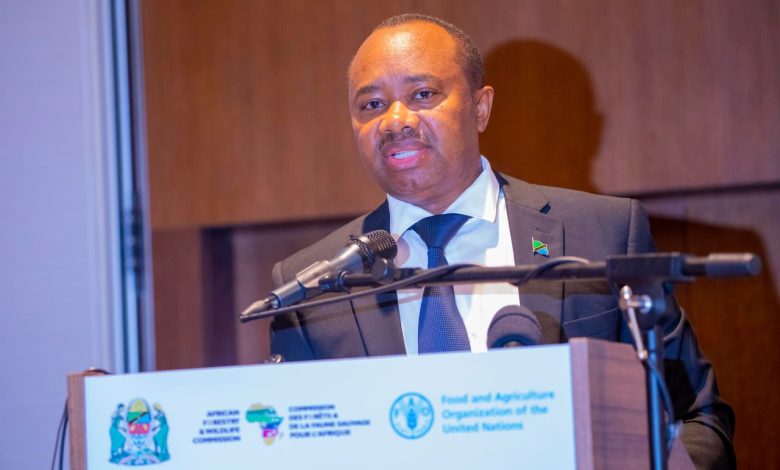
DAR ES SALAAM, March 21 (NNN-DAILYNEWS) — TANZANIA has seen a remarkable surge in revenue from ecotourism, with the latest figures revealing a collection of more than 1.5bn/- in the past three years.
Tanzania Forest Services (TFS) Agency, Chief Executive Officer, Professor Dos Santos Silayo told editors and senior journalists in Dar es Salaam that the achievement underscores the significant strides made by the country in leveraging its natural assets to drive economic growth.
He said the boost in revenue can be attributed to a series of deliberate efforts by the government, spearheaded by President Samia Suluhu Hassan through the Royal Tour film.
The film has played a pivotal role in promoting the country’s ecological treasures both domestically and internationally, he said.
TFS statistics indicate a substantial increase in the number of tourists visiting ecotourism centres from 59,606 in the 2020/2021 period to an impressive 242,824 in 2022/2023.
Correspondingly, income generated during this period witnessed a meteoric rise from 154m/- to an about 1.5bn/-
“This is a remarkable achievement for our agency and the tourism sector as a whole,” said Prof Silayo at a meeting organised by the Treasury Registrar’s Office to explain achievements recorded by the agency in three years of President Samia’s administration.
“We have witnessed unprecedented growth in ecotourism, surpassing any previous records.”
Buoyed by this success, the agency has set ambitious targets for the coming years, aiming to attract 500,000 tourists and amass 3bn/-in revenue by 2025.
Ecotourism in Tanzania emphasises nature-based experiences of the country’s rich biodiversity and cultural heritage.
As the nation continues to prioritise sustainable tourism practices, it is poised to emerge as a global leader in ecotourism destinations.
Prof Silayo further said efforts to bolster Tanzania’s ecotourism infrastructure have also been underway, with completion of three new hostels in strategic locations such as Wino Forest plantation in Songea District and SaoHill forest in Mafinga District.
Additionally, renovations have been carried out on existing accommodations in the Amani Nature Reserve in Muheza District.
Furthermore, Prof Silayo said significant investments have been made in improving amenities within forest reserves, including the construction of tourist pavilions, gates, signs, benches, and tables across various sites.
He highlighted the agency’s achievements in managing conflicts between reserves and local communities.
“Over the past three years, 423 out of 438 conflicts have been successfully resolved, underscoring the commitment to sustainable forest management and conservation,” he said.
According to him, the exercise resulted in a reserve space of 296,881 hectares for inhabitants’ dwellings, agriculture, and farming.
The community continues to receive conservation and forest management education, which includes clearing borders and erecting stakes and banners to avoid encroachment on protected areas.
“TFS remains steadfast in its mission to manage and conserve our forest and bee resources,” stated Prof Silayo.
“Our efforts aim to ensure the sustainable supply of quality forest products and services for the benefit of present and future generations.”
TFS is mandated to manage national forest reserves (natural and plantations), bee reserves and forest and bee resources on general lands. The establishment of the TFS as an Executive Agency is anticipated to enhance the management and conservation of forest and bee resources for a sustainable supply of quality forest and bee products and services.
The agency is managing about 464 forest reserves; 158,000 ha of mangrove, 23 nature forest reserves, and 12 bee reserves.
He said during the three years of the sixth phase government, TFS has established two tree farms in Tunduru and Kasulu districts with a total size of 102,178 hectares, 97.5 million seedlings of different trees were produced, of which 48 million seedlings were distributed to the public, and 67.6 tonnes of seeds of various trees were produced.
Prof Silayo also known as the Conservation Commissioner said that Tanzania has a capacity of 10 million bee colonies and the potential production of 138,000 tonnes of honey and 625 tonnes of beeswax.
“The production is approximately 9,380 tonnes of honey and an average of 625.3 tonnes of beeswax. There are stinging and stingless bees in varieties of races.
Beekeeping is practised in most rural areas, particularly in miombo woodlands of southern highlands, central, west and northern zones,” he noted. — NNN-DAILYNEWS




